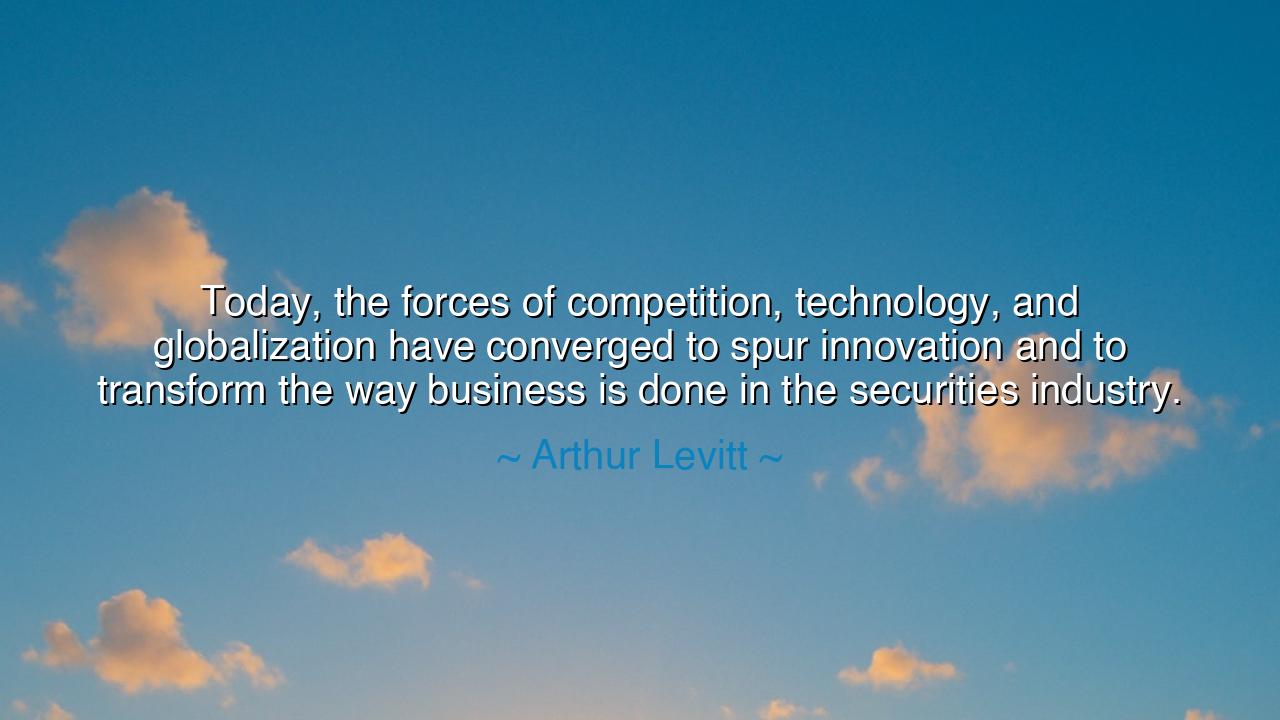
Today, the forces of competition, technology, and globalization
Today, the forces of competition, technology, and globalization have converged to spur innovation and to transform the way business is done in the securities industry.






The words of Arthur Levitt, former chairman of the U.S. Securities and Exchange Commission, bear the weight of prophecy for the modern age: “Today, the forces of competition, technology, and globalization have converged to spur innovation and to transform the way business is done in the securities industry.” This saying is no mere observation, but a revelation of how the currents of history entwine. Just as rivers, when joined, become a torrent that reshapes the land, so too have these three forces — competition, technology, and globalization — converged to carve a new landscape for commerce and human endeavor.
The meaning of competition is ancient. It is the fire that sharpens the sword, the storm that strengthens the oak. Without it, business becomes complacent, stagnant, a pond without flow. In the securities industry, where fortunes rise and fall like the tides, competition ensures vigilance, adaptability, and the constant pursuit of excellence. It prevents the slumber of giants and allows smaller, hungrier players to challenge them with boldness. Thus, competition is not destruction, but renewal — a crucible through which innovation is refined.
Technology is the second force Levitt names, and its role is no less transformative. From the invention of the telegraph, which first carried stock prices across continents, to the rise of computers that execute trades in fractions of seconds, technology has redefined speed, reach, and possibility. Where once men shouted on the floors of exchanges, now silent algorithms race across invisible highways of data. The tools have changed, but the principle is eternal: technology amplifies human capacity, and those who embrace it prosper, while those who shun it are left behind.
The third force, globalization, spreads like the winds that carried ancient sailors across seas. Where once trade was bounded by cities and nations, now it spans continents. A decision in Tokyo reverberates in New York; a policy in Frankfurt echoes in São Paulo. In the securities industry, globalization means that capital flows freely, opportunities are vast, but risks are also shared. Just as the Silk Road brought together East and West, uniting civilizations in trade, so too does globalization weave markets into a single, living tapestry.
History offers a striking story: in the late 20th century, when financial markets opened to international flows, countries like South Korea and Singapore transformed from modest economies into global powerhouses. They harnessed competition by opening their markets, they adopted technology to modernize their systems, and they embraced globalization by trading with the world. Within decades, they rose from obscurity to prominence, proving that the convergence of these forces can indeed transform destiny itself.
Levitt’s words, then, are both a warning and a call to action. They remind us that change is not optional, but inevitable. To resist competition is to grow weak. To ignore technology is to become obsolete. To deny globalization is to isolate oneself from the shared destiny of humanity. The wise do not curse the river’s flow — they build their ships and sail it.
The lesson for us is clear. Whether one is a leader in business, a worker in trade, or even a student preparing for the future, the path forward lies in embracing these forces with courage. Learn to adapt, and competition will sharpen you. Learn to wield tools of innovation, and technology will empower you. Learn to open yourself to the world, and globalization will expand your horizons.
Thus, let this teaching be carried forth: the convergence of these forces is not to be feared but harnessed. Just as past generations tamed fire and harnessed steam, so must our generation tame the forces of commerce that shape our age. For those who rise to this challenge, the promise is great: to not only survive the storms of change but to ride them toward horizons of opportunity undreamed of by the ancients.






AAdministratorAdministrator
Welcome, honored guests. Please leave a comment, we will respond soon